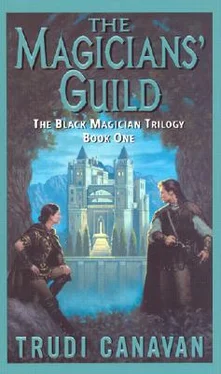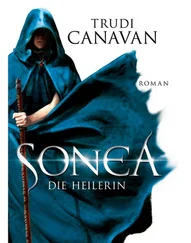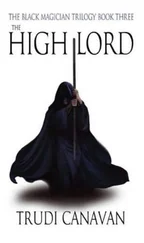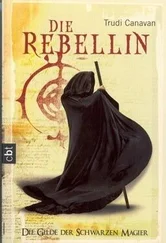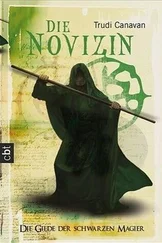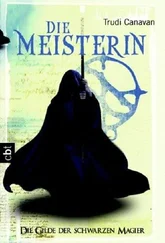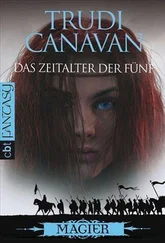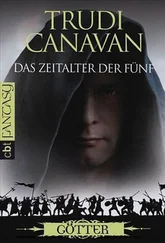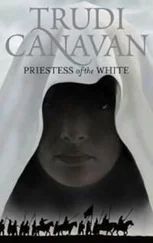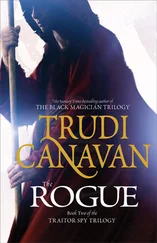“I’ve had one of my men question the shopkeepers. He will fill you in. Take this.” He handed Cery a small, folded piece of paper. “Wait in the room outside.”
Cery turned, then hesitated. He looked back at Faren and considered whether it would be an appropriate moment to ask after Sonea.
“Soon,” Faren said. “Tomorrow, if all goes well.”
Nodding, Cery strode to the door and stepped through. Though the burly guards eyed him suspiciously, Cery smiled back. Never make enemies of someone’s lackeys, his father had taught him. Better still, make them like you a lot. This pair looked so similar they had to be brothers, though a distinctive sear across one man’s cheek made it easy to tell them apart.
“I’m to wait here,” he told them. He gestured to a chair. “Taken?”
The scarred one shrugged. Cery sat down and looked around the room. His eyes were drawn to a strip of bright green cloth hanging from a wall, an incal stitched in gold at the tip.
“Hai! Is that what I think?” he asked, rising again.
The scarred man grinned. “It is.”
“A saddle-ribbon from Thunderwind?” Cery breathed. “Where’d you get it?”
“My cousin is stable hand at House Arran,” the man replied. “Got it for me.” He reached out and caressed the cloth. “Won me twenty gold, that horse.”
“Sired good racers, they say.”
“Never be one like him again.”
“Did you see the race?”
“Nah. You?”
Cery grinned. “Snuck past the feemasters. Was no easy trick. Didn’t know it was going to be Thunderwind’s day. Just lucky.” The guard’s eyes misted over as he listened to Cery describe the race.
A knock at the door interrupted them. The silent guard opened the door, admitting a tall, wiry man with a sour expression in a black longcoat.
“Ceryni?”
Cery stepped forward. The man examined him, his brows rising, then gestured for Cery to follow. Nodding to the guards, Cery started down the passage.
“I’m to fill you in,” the man said.
Cery nodded. “What do the thugs look like?”
“One’s my height, but heavier, the other’s smaller and skinny. They’ve got short black hair—cut it themselves from the sounds of it. The bigger one’s got something odd with one of his eyes. One shopkeeper said it was colored funny, another said it looked oddways. Elsewise, they’re regular dwells.”
“Weapons?”
“Knives.”
“Know where they live?”
“No, but one of the shopkeepers seen them in a bolhouse tonight. You’re going there now, so you can track them. They’re sure to take the long way home, so be sly about it.”
“Of course. What’s their style?”
The man glanced back, his expression unreadable. “Rough. Beat up the shopkeepers and some family. Didn’t stop to play, though. Just got out when they had what they came for.”
“What did they take?”
“Coin, mostly. A bit of drink if it was around. We’re almost there.”
They emerged from the passages into a dark street. The guide extinguished the lamp and led Cery to a larger thoroughfare, then stopped in the shadows of a doorway. The sounds of revelry from across the road drew his attention to a bolhouse.
His companion made a quick gesture, his hands forming a silent query. Following the man’s gaze, Cery caught a movement in a nearby alley.
“They’re still there. We wait.”
Cery leaned against the door. His companion remained silent, watching the bolhouse intently. Rain began to fall, pattering on roofs and forming puddles. While they waited the moon rose above the houses and flooded the street with light, before reaching the gray clouds and becoming a ghostly glow in the sky.
Men and women left the bolhouse in small groups. As a large group of men stepped out into the street, laughing and staggering drunkenly, Cery’s companion tensed. Looking closer, Cery saw two figures slip past the revellers. The watcher in the alley made another movement with his hands and Cery’s companion nodded.
“That’s them.”
Nodding, Cery stepped out into the rain. He kept in the shadows as he followed the two men down the street. One was clearly drunk; the other navigated the puddles with confidence. Letting them gain some distance, he listened as the drunk man berated his companion for drinking too little.
“Nothin’ll ’appn, Tull’n,” he slurred. “We t’ smar’ fr them.”
“Shut it, Nig.”
The pair took a circular journey through the slums. From time to time, Tullin stopped and looked about. He never saw Cery standing in the shadows. Finally, exasperated by his friend’s chatter, he took a straight route of several hundred paces across the slums, and arrived at an abandoned shop.
Once the pair had disappeared inside, Cery crept closer, examining the building. A sign lay on the ground outside. He recognized the word for raka. Placing a hand on his chest, he considered the message waiting in his pocket.
Faren wanted it delivered in such a way that would frighten the thugs. The pair had to be shown that the Thieves were aware of everything: who they were, where they were hiding, what they had done, and how easily the Thieves could kill them. Cery bit his lip, considering.
He could slip the note under their door, but that was too easy. It wouldn’t frighten the thugs as much as discovering that someone had been inside their hideout. He would have to wait until they went out again, then slip inside.
Or would he? Returning home to find a message in their hideout was going to scare them, but not as much as waking up and realizing that someone had been there while they were asleep.
Smiling, Cery considered the hideout. It was part of a row of shops, each sharing a wall with the next. That left only the front and back for entry. Moving to the end of the street, Cery entered the alley which ran behind them. It was filled with empty shipping crates and piles of garbage. He counted doors, and knew he had found the thugs’ shop by the stinking bags of rotting raka leaves piled against the wall. Dropping into a crouch, he peered through the keyhole of the shop’s back door.
A lamp burned in the room beyond. Nig lay in a bed to one side, snoring softly. Tullin paced about, rubbing his face. When he turned into the lamplight, Cery could see his twisted eye and deep shadows under it.
The big man hadn’t been sleeping well—probably worried about the Thieves dropping in for a visit. As if reading Cery’s thoughts, Tullin suddenly strode toward the back door. Cery tensed, ready to slip away, but Tullin didn’t reach for the handle. Instead, his fingers closed around something in mid-air and traced its path upward, out of sight. String, Cery guessed. He didn’t need to see what was suspended above the door to guess that Tullin had laid a trap for unwanted visitors.
Satisfied, Tullin moved to a second bed. He pulled a knife from his belt and placed it on a nearby table, then topped up the oil in the lamp. Taking one last look around the room, he stretched out on the bed.
Cery considered the door. Raka arrived in Imardin as stalks of beans, wrapped in their own leaves. The beans were stripped off the stalks by the shop owners and roasted. The leaves and stalks were usually dropped into a chute leading to a tub outside and the tubs were collected by boys who then sold their contents to farmers near the city.
Moving along the wall, Cery located the outer flap of the chute. It was locked from the inside with a simple bolt—not difficult to open. He drew a tiny flask from his coat, and a slim, hollow reed. Sucking a little oil into the reed, he carefully oiled the bolt and the hinges of the flap. Putting flask and reed away again, he drew out a few picks and levers, and began manipulating the bolt.
Читать дальше
